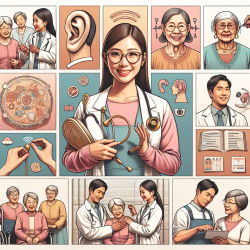In the realm of special education and therapeutic interventions, the importance of tailored programs that address the specific needs of our senior population cannot be overstated. A particularly compelling study, "To Hear Again: A Volunteer Program in Hearing Health Care for Hard-of-hearing Seniors," sheds light on a critical area of need—the hearing health care of hard-of-hearing seniors residing in care facilities. This research not only highlights the prevalence of hearing impairment among the elderly in institutional settings but also introduces an innovative volunteer program aimed at improving their quality of life.
The staggering statistic that between 48% to 97% of seniors in continued-care facilities suffer from hearing impairments underscores a pressing issue: the lack of preparedness among care staff to address hearing-related needs and the absence of regular services from hearing health care professionals. The "To Hear Again" project, spearheaded by the Canadian Hard of Hearing Association (CHHA), presents a solution through the deployment of trained volunteers. These volunteers, themselves hard-of-hearing seniors, are prepared to serve as peer role models and helpers, offering support and assistance to their counterparts in care facilities.
The program's foundation lies in its consumer-driven approach, emphasizing the empowerment of hard-of-hearing seniors through education and peer support. By training volunteers to understand the physical and psychological effects of hearing disorders, care for hearing aids, and utilize assistive listening devices, the project equips them with the skills needed to make a tangible difference in the lives of other seniors.
For practitioners looking to enhance their skills and contribute positively to the hearing health care of seniors, this research offers valuable insights. Implementing the outcomes of the "To Hear Again" project in your practice could involve:
- Advocating for and participating in the establishment of volunteer programs within your community or institution.
- Encouraging the adoption of a consumer-driven approach to hearing health care, where seniors are empowered to support one another.
- Facilitating training sessions for volunteers, focusing on the care of hearing aids, the use of assistive listening devices, and strategies for coping with hearing loss.
- Building partnerships between health care providers and consumer organizations to foster a collaborative approach to hearing health care for seniors.
The project also highlights the importance of cooperation between public health units and consumer organizations, suggesting a model for future initiatives aimed at addressing the needs of hard-of-hearing seniors. By integrating the strategies and outcomes of the "To Hear Again" project into your practice, you can play a pivotal role in enhancing the well-being of seniors with hearing impairments.
Moreover, this research prompts practitioners to consider further investigation into the needs of hard-of-hearing seniors and the efficacy of volunteer programs in meeting these needs. Encouraging ongoing research and dialogue in this area can lead to the development of more comprehensive and effective interventions for the hard-of-hearing senior population.
In conclusion, the "To Hear Again" project offers a promising model for improving the hearing health care of hard-of-hearing seniors through volunteerism and peer support. As practitioners, embracing and implementing the findings of this research can lead to significant advancements in the care and support provided to our senior population. For those interested in exploring this topic further and considering its application in their professional practice,
To read the original research paper, please follow this link: To Hear Again: A Volunteer Program in Hearing Health Care for Hard-of-hearing Seniors.










